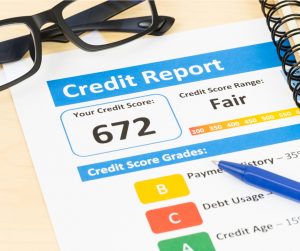FICO is the credit score used by banks to determine whether they’ll grant you a mortgage loan and if so, what interest rate you’ll pay on that loan. FICO is just one type of credit scoring. Insurance companies and others use different scoring methods.
Before granting a loan, banks look at a borrower’s FICO score along with other factors such as income, employment history, and assets owned.
FICO scoring was created by the Fair Isaac Corporation to assess the likelihood that you will uphold you obligation to make regular payments on a home loan. It assigns borrowers a 3-digit score based on credit reports from each of the major U.S. credit bureaus: Experian, Equifax, and TransUnion. While these reports will be similar, they are generally not exactly the same because not all businesses report to all three credit bureaus.
FICO scores range from 300 to 850, with 850 being a perfect credit score. If your score is 750 or higher, your score is rated excellent and you’ll be in line for the best interest rates. From 700 to 750 is good, while 650 to 699 is fair. Anything under 650 is rated poor. If you get a mortgage loan with a score under 650, you’ll pay the highest interest rates in the industry.
What this means to you if you’re planning to buy a home is that it is in your best interests to raise your FICO score as high as possible.
How is a FICO Score calculated?
35% is based on your payment history. Since this is the largest factor, it always pays to make every payment and to make it on time. One 30-day delinquency can drop your score by as much as 110 points.
Time does heal, so don’t panic if you’ve had late payments in the past. The negative notation will fall from your credit report after 7 years, and the greater length of time since the last late payment, the better your scores will become.
30% is based on your debt-to-credit percentages. Many would-be borrowers have cancelled credit card accounts in an effort to raise their scores, and it works exactly opposite. The more credit you have available that you don’t use, the better. The optimum number here is 30%. Do your best to pay every credit card down to less than 30% of the credit available to you.
What can you do to lower this percentage if you don’t have funds available to pay down the balances? Ask your current credit card companies to increase your credit limit – then don’t use the increase.
15% is based on the length of your credit history. If your track record of responsible payments is 20 years old you’ll be in much better shape than if it’s only 6 months old. More than one would-be homeowner has been dismayed to learn that they had low or no credit ratings because they’ve saved their money and paid cash for everything over the past 20 years.
10% is based on your mix of credit. They like to see that you’ve had some mixture of credit cards, car loans, student loans, installment payments at department stores, personal bank loans, and of course, mortgage loans.
10% is based on new credit accounts, and this one is a negative. Opening new credit card or department store accounts within a short period of time seems to be a red flag, lowering your credit worthiness. A new account might lower your debt to credit ratio, but it will also lower the average number of years on your credit history. This red flag is the reason why real estate professionals and mortgage lenders caution borrowers not to go shopping and give any sales person their social security number. You don’t want any new credit inquiries on your report.
Do check your credit report regularly.
Reporting errors are common, and some errors could affect your scores. You may have a perfect bill-paying history, but if someone with the same name as yours does not, their missed payment could inadvertently appear on your credit report.
You can get a free credit report at CreditKarma.com and at AnnualCreditReport.com. In addition, some credit card companies now offer free credit scores and reports to their customers. Do take advantage of that service.
If you find an error you’ll need to contact the credit bureau that is reporting the mistake, then show them proof that it IS a mistake. After that it will take some time to remove the error, so don’t wait until you’re ready to buy a home to review your report.
If you’re just starting to think about buying a home, get in touch with us at Homewood Mortgage, the Mike Clover Group. We’ll be glad to get you pre-approved for a mortgage loan, and if your credit scores need to come up a bit in order to get the best interest rate, we’ll be happy to provide advice.
Call today: 800-223-7409.










Pingback: คาสิโนออนไลน์ lsm99
Pingback: torqeedo electric motor|achiles boat|achillies inflatable boat|yamaha vmax 2021|avon boats|achilies boats|achillies inflatable boats|200 hp merc outboard|avon inflatable boats|avon boat|avon inflatable boat|honda boats|200hp mercury outboard|achillies inf
Pingback: อุปกรณ์ไอที
Pingback: nagaway สล็อต เว็บตรง
Pingback: auto swiper
Pingback: ติดเน็ตบ้าน AIS
Pingback: ทัวร์เกาะหลีเป๊ะ
Pingback: pgroyalbet
Pingback: Junk search engine
Pingback: พิมพ์สติกเกอร์ฉลากสินค้าแบบม้วน
Pingback: magnum research guns
Pingback: kikoko
Pingback: pragmatic play live casino เปิดให้บริการ เกมพนันอะไรบ้าง ?
Pingback: โคมไฟ
Pingback: Bobs SEO
Pingback: ข้อดีของ 4×4 bet
Pingback: parches de fentanilo y morfina
Pingback: เว็บตรง ฝากถอนไม่มีขั้นต่ำ
Pingback: สล็อตเกาหลี
Pingback: ป้ายห้อยสินค้า
Pingback: สอนสัก
Pingback: Destination Wedding in France
Pingback: โคมโรงงาน
Pingback: ตั๋วรถทัวร์
Pingback: เว็บตรงฝากถอนง่าย
Pingback: expanse มีอะไรให้เล่นบ้าง?
Pingback: ซักรีดโรงแรม
Pingback: Plus d'informations
Pingback: nagatop situs scam
Pingback: website
Pingback: Undress AI
Pingback: Jeffrey
Pingback: pg168
Pingback: FORTUNE DRAGON
Pingback: ขายอะไรดี